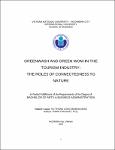| dc.description.abstract | This thesis was conducted to study the greenwash practices of hotels in the tourism and hospitality industry in Vietnam. To meet the increasing demands of tourists, especially international visitors, Vietnam's hotels and resorts are becoming more aware of the need to establish an environmentally friendly brand. This study has utilized the altitude behavior-context theory and the theory of planned behavior to examine how greenwash influence travelers’ green trust and green word-of-mouth. Quantitative approach was applied to this study. The sample was used to derive quantitative information on the attitudes, behaviors, and attributes of the whole population. Gathering data on correlations between variables is done via a survey, which was analyzed using descriptive statistics and regression analysis. In brief, the findings of this study indicate that hotels' use of greenwashing practices have two different ways in which they adversely affect the green word of mouth created by travelers. A moderating influence on the relationship between greenwash and green trust, as well as between greenwash and green WOM, was identified in the research as a result of the connectedness to nature factor. | en_US |


